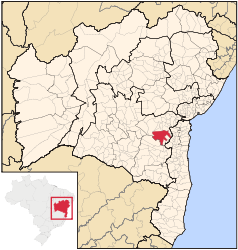Jequié
| Município de Jequié "Cidade Sol", "Chicago Baiana"
Jequié
|
|||
|---|---|---|---|
|
View of the center of Jequié
|
|||
|
|
|||
| Coordinates | 13 ° 51 ′ S , 40 ° 5 ′ W | ||
 Location of the municipality in the state of Bahia Location of the municipality in the state of Bahia
|
|||
| Symbols | |||
|
|||
|
Motto “Todo Poder Emana do Povo” All power comes from the people |
|||
| founding | 1897 | ||
| Basic data | |||
| Country | Brazil | ||
| State | Bahia | ||
| ISO 3166-2 | BR-BA | ||
| Região intermediária | Vitória da Conquista (since 2017) | ||
| Região imediata | Jequié (since 2017) | ||
| height | 215 m | ||
| climate | tropical, Aw | ||
| surface | 2969 km² | ||
| Residents | 151,895 (2010) | ||
| density | 51.2 Ew. / km² | ||
| estimate | 155,800 (July 1, 2018) | ||
| Parish code | IBGE : 2918001 | ||
| Post Code | 45200-001 to 45214-999 | ||
| Time zone | UTC −3 | ||
| Website | www.jequie.ba.gov.br (Brazilian Portuguese) | ||
| politics | |||
| City Prefect | Sérgio da Gameleira (2017-2020) | ||
| Political party | Partido Socialista Brasileiro (PSB) | ||
| economy | |||
| GDP | 2,239,664 thousand R $ 13,865 R $ per person (2015) |
||
| HDI | 0.665 (2010) | ||
Jequié , officially Portuguese Município de Jequié , is a Brazilian city in the state of Bahia . In 2010 it had 151,895 inhabitants, who are called Jequieans. In 2018 the population was estimated at 155,800 residents. The city is located 210 km southwest of Salvador da Bahia , the capital of the state, on the Rio de Contas , in the transition between the savannah belt and the forest zone ( zona da mata ). The Jequié area is rich in iron ore.
history
The place Jequié emerged from a fiefdom of the Portuguese João Gonçalves da Costa, who had founded the Fazenda Borda da Mata. The fazenda was later sold to José de Sá Bittencourt. He had fled from Minas Gerais to Bahia after a conspiracy against Portuguese rule ( Inconfidência Mineira ) (Minas conspiracy) failed in 1789. After Bittencourt's death in 1828, the property was divided among his heirs, and part of the fazenda was henceforth called Jequié.
Jequié developed into a city in the second half of the 19th century thanks to busy markets that attracted traders from a wide area. Inland shipping on the Rio de Contas and mule transports allowed Jequié to be supplied with all essential goods from larger cities. Jequié became a transshipment point for the southeast and southwest of Bahia and for the catchment area of the Rio de Contas; the nascent city grew along the banks of the river.
Since 1860 Jequié belonged to the municipal city of Maracás . In view of its increasing importance as a trading center, Jequié was detached from Maracas in 1897 and made an independent municipality under the first mayor Urban Gondim. In 1910 Jequié received city rights. Today the city is one of the largest and richest communities in Bahia.
On November 7, 1978, the city became the seat of the Roman Catholic Diocese of Jequié .
Derivation of the place name
The name “Jequié” means “jaguar” in the language of the indigenous people , alluding to the large number of these animals in the region. According to another explanation, the place name derives from the word "Jequi", a funnel-like object used by the Indians for fishing in the Rio de Contas.
It bears the nicknames Cidade Sol (Sun City) and Chicago Baiana (Chicago of Bahia).
climate
Jequié is known for its warm climate. Surrounded by mountains, the city suffers from the heat for most of the year. On summer days the temperature can reach 48 ° C, but it can also get very cold at night. The Köppen-Geiger climate classification is Aw .
sons and daughters of the town
- Antônio Tourinho Neto (* 1964), Catholic clergyman, Bishop of Cruz das Almas
- Guilherme (* 1988), football player
literature
- Émerson Pinto de Araújo: Capítulos da História de Jequié . ETUC Editora, Salvador da Bahia 1997.
- Nice Lecocq Müller: Jequié. Estudo de geografia urbana . Avulso / Associação dos Geógrafos Brasileiros, São Paulo 1970.
- Mílton Santos: A cidade de Jequié e sua região . In: Revista brasileira de geografia. Vol. 18 (1956), No. 1, pp. 71-112. ISSN 0034-723X .
Web links
- City Prefecture website (Brazilian Portuguese)
Individual evidence
- ↑ Sérgio da Gameleira 40 (Prefeito). In: com.br. Eleições 2016, accessed October 6, 2018 (Brazilian Portuguese).
- ↑ IBGE : Cidades @ Bahia: Jequié - Panorama. Retrieved October 6, 2018 (Brazilian Portuguese).
- ↑ IBGE : Estimativas da população residente no Brasil e unidades da federação com data de referência em 1 ° de julho de 2018. (PDF; 2.6 MB) In: ibge.gov.br. 2018, accessed October 6, 2018 (Brazilian Portuguese).
- ↑ IBGE : Jequié - História. , Outline of the history of the city of Jequié. Retrieved October 6, 2018 (Brazilian Portuguese).
- ↑ Climate Jequié: Weather, climate table, and climate diagram for Jequié. In: climate-data.org. de.climate-data.org, accessed on October 6, 2018 .



